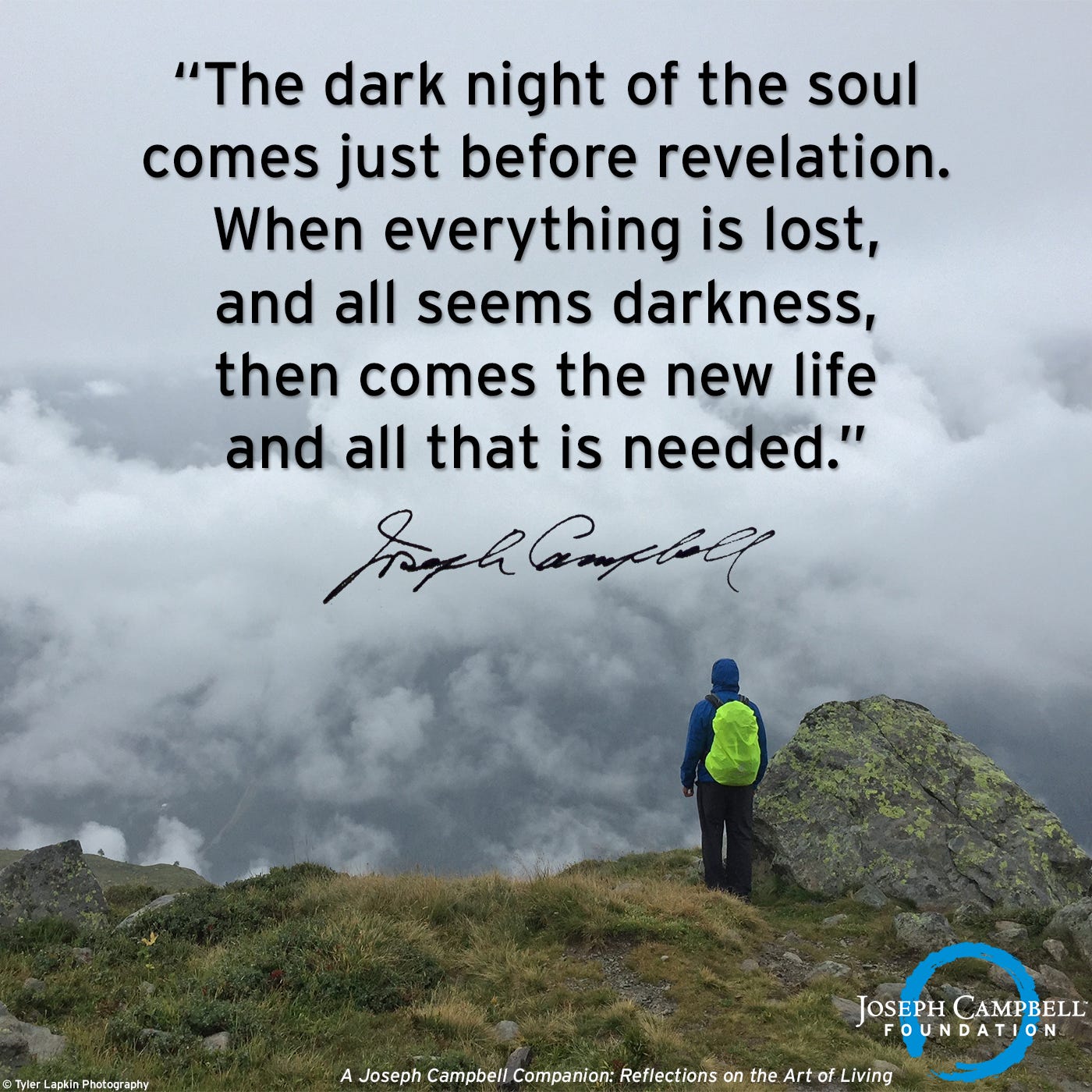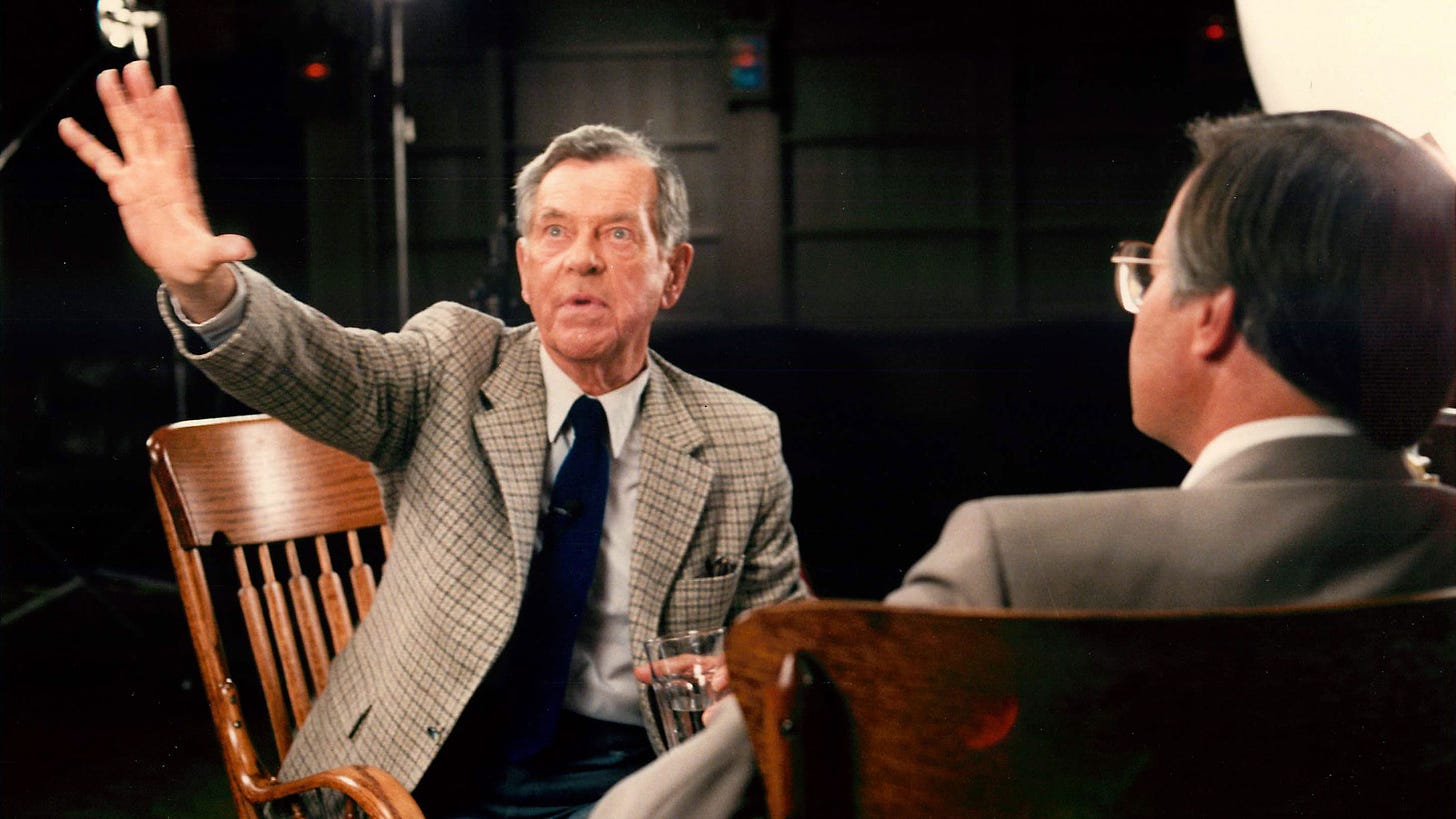Joseph Campbell New York, 1904-1987) PBS interview with Bill Moyers, published posthumously as The Power of Myth (1988), was one of my foundational books growing up. As a tween in the early '90s, when moral upbringing was outsourced to Sunday school and the epilogues of Saturday morning cartoons, Campbell became a father figure to me. Embracing the mythical thinking that he championed, I grew up holding him both in reverence and with a natural disposition towards parricide.
You see, after imprinting on him like a baby bird, Campbell naturally became my subject of parental de-idealization. Having once sparked my passion for mythology, I found that the deeper I dove into its sources, the shallower Campbell’s thoughts appeared to be. I eventually came to accept him as a flawed father figure; a virtuous storyteller whose main contribution to the field was not in the quality of his thoughts but in their popularization. In my mind, Joseph Campbell would become to mythology what Andrea Bocelli would later be to opera.
Despite the similar contempt for him that anthropologists and folklorists would express over the years, Campbell clearly succeeded in making mythology go mainstream, and his flagship book, The Hero with a Thousand Faces (1949) made him a beloved household name in America. And yet, success came at the cost of levity: to this day, his influence has hardly transcended Hollywood scriptwriting (which peaked with George Lucas in the ‘80s, who celebrated Campbell as a creative inspiration behind Star Wars and regarded him as his Yoda); and the self-proclaimed epitome of his philosophy —the feel-good mantra “follow your bliss”— is unlikely to make the annals of 20th century thinking.
The Joseph Campbell Foundation (@jcf_org) now tweets motivational posters with his quotes. #FollowYourBliss
At the root of this tension between Campbell’s philosophical aspirations and the personal disappointment that ensued, lies the concept of the Monomyth or Hero’s Journey, which is the basic framework that he lays out in The Hero with a Thousand Faces to structure mythology on a universal scale. In it, he posits that myths inherently follow a sequence of archetypal episodes, and that their spontaneous recurrence across discrete mythologies reveals an absolute truth that is essential to understanding ourselves and the world.
The iconic scheme above, though, is terribly misleading. While it connotes a storyline that loops back into its own origin, Campbell’s monomyth is as linear as can be. Adopting a classic, three-act theatrical structure —a beginning or “departure”, a central “initiation”, and a denouement or “return”—, each part is broken down into recurring subplots and leitmotifs that articulate the actions of the Protagonist-Hero as he journeys from his initial call to adventure to his triumphant return, which restores the world… except these episodes are not always there, don’t always follow the same order, and their themes can vary drastically.
Campbell explains, for instance, that the hero’s “initiation” can climax with a Sacred Marriage.
Or an Atonement of the Father Figure.
Or an Apotheosis.
Or a Theft of an Elixir.
At this point, one wonders what good is a universal structure when its components seem so circumstantial.
That said, my fundamental critique of Campbell’s monomyth is not its dubious absoluteness, but that the fundamental structure of myths is not linear, but cyclical. While Campbell would present the stories of Jesus, Prometheus, Gilgamesh and Luke Skywalker as fitting the same archetypal mold, I would counterargue that these myths have no single storyline to compare to in the first place. Jesus at the Cross corresponds to Prometheus at Caucasus, sure; but the analogy doesn’t stretch so as far as to cover Prometheus’ prior involvement in the Titanomachia, his duality with his brother Epimetheus, or his rescue by Heracles.
Campbell’s blind spot is the failure to acknowledge that myths aren’t units. The start and endpoints of myths are blurry at best, and they can be better understood as a concatenation of multiple, complex and highly unique stories that extend over several heroes, adventures and timelines, and can span uninterruptedly from cosmogenesis to apocatastasis.
Rather than pointing out the similarities between Heracles’ and Theseus’ labors in Greek mythology, I prefer to zoom out and analyze this whole body of Greek myths as a multi-generational chain reaction of events, together with the broader themes that tie them together. The castration of Uranus at the very beginning is directly linked to the birth of Achilles at the very end, in that they both relate to the theme of sons surpassing their fathers. Herein lies the more valuable structure underpinning mythology that I will develop for you in this Substack.
To do so, I’ll present an alternative mythological framework I candidly call the Deed/Deed Undone, wherein a foundational myth climaxing in a heroic Deed necessitates the existence of a sequel myth in which that Deed is Undone, which in turn, can bring about another sequel to counter the Undoing, and so forth. Thus, monsters are spawned solely to be slain, curses are placed only to be lifted, prophecies are avoided only to be fulfilled, swords are forged only to be broken, kingdoms are built only to collapse, sons castrate their fathers only to be castrated themselves by their sons. You get the gist.
This is, of course, a very broad brush stroke that doesn’t pretend to cover the whole canvas of mythology, but which can thread adjacent myths without the pretense of a shoehorned universality. It is the starting point of a general framework which I will break down in the next entry of Applied Mythology.
…and a Fun Fact. In case you missed it, the reference to Achilles’ birth and inter-generational succession is based on the prophecy that Thetis, his mother, would have a son that far surpassed his father. Zeus and Poseidon passed (for once!) and she ended up marrying Peleus, king of Phthia, a hero in his own right but whose prowess was in no way comparable to that of his son
・:*:・゚★


